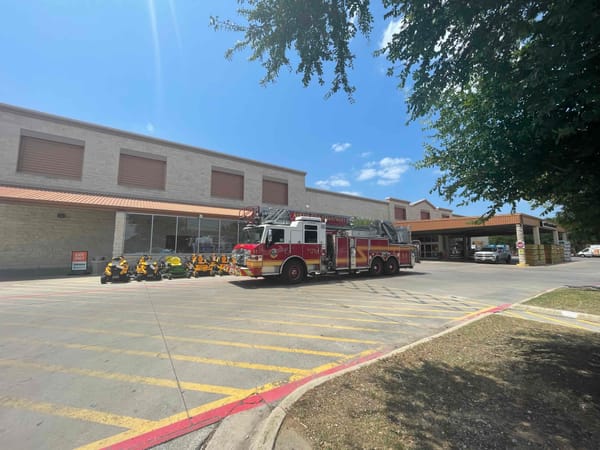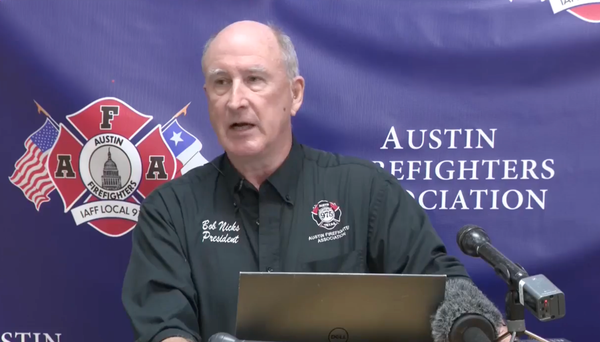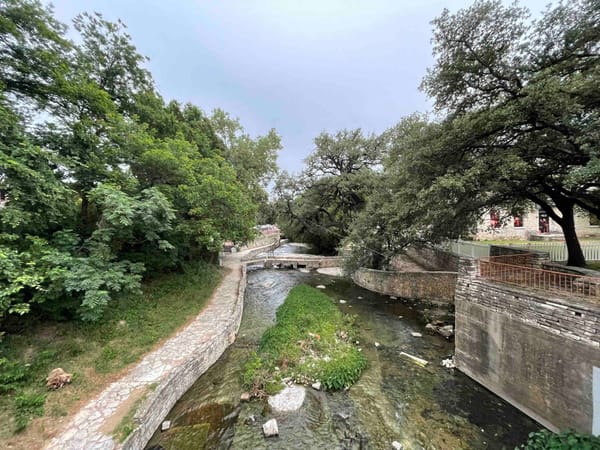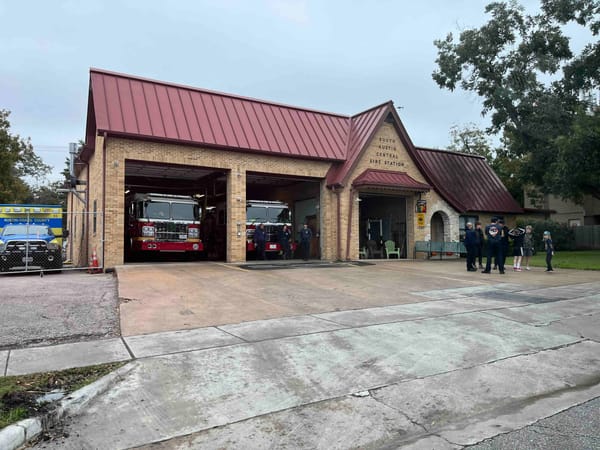Watson calls in the troopers
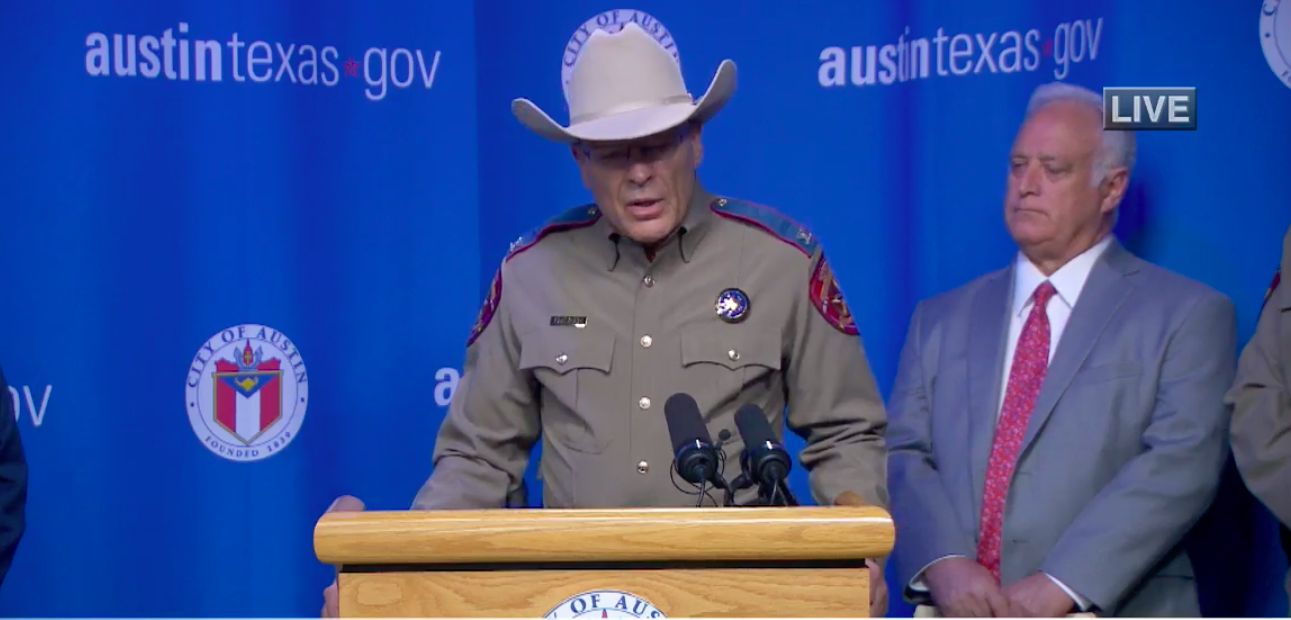
Correction: Yesterday I accidentally wrote, "The opposition from Butts and the Windsor Park neighborhood association, however, did sway Chito Vela, who represents the area, from supporting the rezoning."
It should have said didn't sway.
Yesterday, out of the blue, Mayor Kirk Watson announced a new "partnership" with the state Department of Public Safety to bolster the Austin Police Department's patrol. From KUT:
Troopers from the Texas Department of Public Safety will soon start helping out the Austin Police Department, which has been short-staffed.
“This partnership will improve safety and provide a runway as we recruit more officers and work to retain those currently on the force,” Austin Mayor Kirk Watson said at a news conference Monday.
Gov. Greg Abbott directed DPS to provide the department with a violent crime suppression task force. The mayor said the city is not paying for the support.
Watson said the arrangement happened shortly after he discussed the issue with Texas Lt. Gov. Dan Patrick. He attributed the quick turnaround to the good relationship between local government and state leaders.
The length of the partnership and exactly how many troopers will help out is yet to be determined.
Here are my questions:
- Doesn't DPS have its own staffing shortage? At least they did as of three weeks ago:
DPS is currently 550 troopers short, Director Steve McCraw said.
“We have received many complaints that we aren’t staffing the highways as there's an expectation,” McCraw said. “It’s because we don’t have enough bodies to go around, plain and simple.”
2. And therefore...why are Greg Abbott and Dan Patrick helping us out?
In explaining actions in politics, one should always leave open the possibility that a politician is simply doing something because they believe it to be right.
But that doesn't strike me as the most likely explanation for either of these men, both of whom have spent decades as craven, amoral parasites who prioritize political theatre over public policy. Texas has the highest uninsured rate in the country because both have refused to accept billions of dollars offered by the federal government that would provide health care coverage to millions of their constituents. They have both expended far more political capital amplifying anti-vaccine sentiment than encouraging people to get the life-saving Covid vaccine. In an effort to amplify the narrative of a border crisis, they have diverted an enormous amount of public safety resources to conduct traffic stops in some of the safest communities in the state. In his first year as governor, Greg Abbott dispatched the Texas State Guard to "monitor" U.S. military exercises to appease a small number of deranged conspiracy theorists.
I'm not saying Watson should only do business with political partners whose motives are pure, but it's worth considering what they hope to get out of this deal before agreeing to it.
2. Doesn't City Council have to approve this?
Yesterday's announcement would leave people to believe that the mayor of Austin has the authority to unilaterally negotiate an agreement with another governmental jurisdiction. But the mayor is just a glorified Council member; he doesn't have any formal power that distinguishes him from the ten other elected officials on the dais. So that's weird.
The deal Mayor Kirk Watson worked out with Gov. Greg Abbott and Lt. Gov Dan Patrick appears to not have involved City Council. Certainly Council didn't vote on it and several Council Members learned of it 15 minutes before Watson announced it publicly. https://t.co/mBDJnkjrnB
— Austin Sanders (@daustinsanders) March 28, 2023
Granted, so far it doesn't appear that anyone on Council is holding it against him, at least not publicly. Even Chito Vela, one of the CMs I would expect to be most wary of such a deal, praised Watson in the Austin Monitor. Leslie Pool, Ryan Alter and Mackenzie Kelly issued similar plaudits.
The Statesman reports that Alison Alter "initially said she welcomes the collaboration but later said she would like to see the details."
For what it's worth, her husband, UT history prof Jeremi Suri, has seen enough details:
Austin mayor is turning over public safety to state goons, not subject to city law. Horrible decision that will hurt public safety. Maybe he should outsource the job of mayor if he can’t manage his own police? @ALTERforATX @AustinChronicle https://t.co/GjG8QFn6UH
— Jeremi Suri (@JeremiSuri) March 28, 2023
3. Did Watson call anyone in Dallas before agreeing to this?
In 2019 the Dallas Police Dept, which is dealing with a much greater violent crime problem than Austin, took DPS up on its offer to help. Seven weeks later, six City Council members and the District Attorney held a press conference to report deep dissatisfaction with what DPS had given them.
The numbers are staggering: in seven weeks, troopers have pulled over 12,500 people. That’s something like 255 a day. Community members say they feel targeted. Meanwhile, the Texas Department of Public Safety touts 71 confiscated firearms. In a release Thursday afternoon, DPD also said troopers have made 400 arrests and seized 37 pounds of marijuana, a half-pound of meth, and 1.5 pounds of cocaine. Police say violent crime in the area has fallen 29 percent since the effort began. Murder and robbery remain up 33 and 34 percent respectively over last year.
....The vast majority of the stops—nearly 12,000 of them, DPS told the Dallas Morning News—end in warnings. That raises further concern for Bazaldua, who says he’d rather the city return the focus to community policing. He says state police haven’t offered help outside the traffic stops. “To the best of my knowledge, they have offered the troops and essentially have given us an ultimatum that they are here to help us on their terms or they’re not here to help us,” he says.Is that what we're going to be dealing with here?
And then there's the case of South Texas, where Abbott has cast state troopers in leading roles in his border security stunt. Some highlights from a Texas Monthly expose in June 2021:
...It seemed just about everyone I met had a DPS story to tell. “The question I get from everyone around town is ‘when do they leave?’” confided a police officer in Starr County, who was not authorized to speak to the media.
...The newly elected mayor of La Grulla, a tiny town fifteen miles from Rio Grande City, Patricia Solis, was caught speeding on her way to work. The town’s chief of police, Desi Olivarez, has been stopped at least seven times because of the dark tint on his windows. Neither was ticketed. “You hear the local mechanics or, you know, the farmworkers who have concerns that they’re afraid to go get food because they don’t want to get pulled over and have to risk being deported,” Olivarez told me.
...When a data collection company from Tennessee scouted possible office locations in Starr County, the ubiquitous DPS presence was a distraction. “It took me over a week of trying to convince them this is one of the safest places in the country,” [Starr County Judge Eloy] Vera said, “and to explain that this is just a political show of the governor.” For one of the state’s most impoverished counties, the thought that state troopers are chasing away jobs rather than criminals is deeply upsetting. “We certainly want to secure the border, but this is overkill,” Vera said.
4. Will DPS respect city policies? What about oversight?
The most straightforward example is marijuana possession. After much resistance, APD eventually agreed to direction from City Council to stop enforcing that offense, essentially agreeing to no longer even issue citations for it. There's little reason to believe DPS will follow this policy, since pot possession is still an offense under state law.
There is a reason that APD requires even officers with prior law enforcement experience to go through the Austin Police Academy. It reflects the belief that to be an effective police officer, one must understand the specific policies, procedures and values of the department. Indeed, as Watson noted yesterday, one of the reasons APD has a staffing shortage is because City Council voted in 2020 to delay three scheduled classes of the police academy. The stated reason for that, however, was to design a curriculum that emphasized a more compassionate "guardian" mentality, rather than a paramilitary "warrior" mentality.
What happens if a trooper violates city policy? Will APD's internal affairs unit have the authority to investigate misconduct? Will APD Chief Joe Chacon be allowed to tell DPS that the assistance of a certain trooper is no longer welcome?
The mayor's response
A spokesperson for the mayor provided this statement in response:
“Interim City Manager Garza and Chief Chacon are hammering out the details with the Department of Public Safety, and we’ll have more details to share very soon. This partnership comes at no cost to the city, and the agreement will include transparency, monitoring and reporting. The reinforcements from DPS will support and supplement APD officers, primarily in traffic enforcement, to provide some staffing relief while also ensuring better coverage. And we’ll be able to end the partnership at any point.”
Some additional thoughts
I'm certainly not against accepting some free assistance from the state, but I think it's important to be clear about what exactly they're giving us.
For instance, while it's beyond clear that road design has a much greater impact on safety than traffic enforcement, we could certainly use some traffic enforcement. People have been driving like maniacs since the pandemic, as evidenced by the uptick in crashes and fatalities.
One potential outcome of this deal is that video emerges of a state trooper exhibiting a less-than-optimal level of empathy for an Austin resident and we'll see City Council members and the mayor either rush to rip up the current deal or announce plans to amend the deal with additional symbolic safeguards. But of course, what outrages the median Austin voter may not outrage the median Texas Republican voter, in which case Greg Abbott's interests may no longer align with Kirk Watson's.
Hmm....


